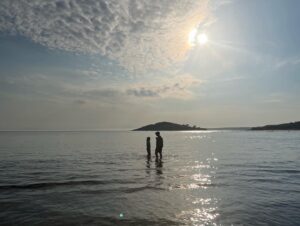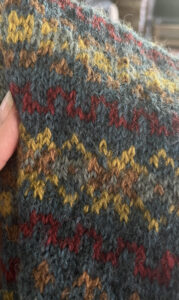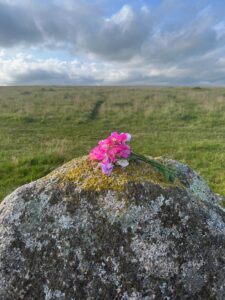Summer on Dartmoor brings loss, standing stones and sweet peas to Kirsteen McNish.

Let us stop
at the moment’s parting,
poised between
two vacant rooms, like blood
moving in the dual chambers
of the heart; let us be red, alive and undone
let us be barely human
Roseanne Watt – Selkie
There is a small stone turning in the pit of my stomach when I allow thoughts of the longer view to seep in. I do not want pity, as my daughter is a gift, and through her prism I shed more of what I don’t need, and keep moving forward with stealth. But there is a reality that when most parents will be waving their kids off to university or the first steps of independent living, my life, our life, will be veering off towards a hazy shape with sides I can’t quite yet discern. All I know is that I hurriedly want to cram in everything I want to do, like a suitcase stuffed for elopement in the night. I am desirous of more solitude after a period of physical burnout. I want to wrestle new plans and ideas into being and to pour words down on the page. My daughter is her own scratch orchestra — abstract and unexpected, vibrant and unpredictable — a quiet song. I wish to walk beside her rather than cutting down every forest to allow her to tread as easily as she deserves. I am her voice, and she reciprocates with a weathervane of deep elemental connection. I am constantly watching and learning.
I read in Lia Leendertz’s Almanac that June ‘is full of celebrations, rituals and happenings but in July it is almost silent’. A time she says, ‘for haymaking’. Tipping over the halfway point of the year I wait for the kids’ lifts home from school and watch as one of my farmer neighbours harvests the yellow grass in the yonder “eye field”, which reminds me to ask him to take me up there with him one day to see this indentation close up. His skill and precision are soporific to watch — curving around the huge stone in the iris of the dark green “eye”, the furrows are ripples in a pond. I fall asleep for a few delirious snatched moments in the long grass and feel the brush of brown butterflies and the sound of crickets with busy legs. A soft yellow cloud of Bird’s-Foot Trefoil blooms close to my head with hundreds of tiny velveteen origami mustard heads.
In the Sunday before Solstice, my partner’s mother dies after two nights in hospital — a sudden but mighty crash. On the Monday before she died, I feel an odd overwhelming impulse, so I thrust the phone into his hand after he finishes work and they speak for the first time in a good while. I hear her voice crackling down the line like old vinyl, sounding weary but perfectly enunciated. She talks about her forthcoming family gathering to finally see our new house — twenty-six years since she left Devon to follow the lichen and peat-coloured moors of Yorkshire instead. She asks for my email address. Three days later she is discovered by friends from her knitting circle, ailing and confused. I try to stay awake to greet my partner as he returns from a six-hour journey under a bruise of a night sky, and I can just about make out his shape in the darkness as he walks towards the front door — his lips unusually thin. As I hold him, he feels like he’s made from sticklebricks.
The next day, he wakes and wants to trace the walks he did as a child with his parents, both now gone — a feeling as strange as curdled milk. He chooses a favourite route on the map and we arrive at Sandwell in the intense heat of midday — me clinging to the sliver of shade by the high hedges as he walks in the lane’s full sun, surprisingly buoyant and chatty. It strikes me poignant and strange we often keep from sharing the best parts of people’s stories until after they are gone. I learn afresh that she once worked at The Observer as a skilled shorthand typist, was a respected erudite legal secretary, enjoyed a spell at Dartington Arts and took her breaks every day in the gardens there shaped by Beatrix Ferrand, admiring the flow of her planting designs. Ferrand was also an intellectual and a woman of letters which I imagine appealed to her being whip smart and wordy. The last physical letter I received was from an ex-lover, and is now pressed between the pages of a book I cannot place — a token of his ardour now asleep between someone else’s sentences.
We reach the brow of the hill at West Leigh to pause and look over the grid of the valley. I’m told despite her being significantly sight impaired due to contracting measles as a child, and unable to drive, his mother, undeterred, co-piloted in car rallies with an old boyfriend, holding the map an inch from her face yelling co-ordinates — fierce in the throes of competition and exhilarated by the blur of landscapes whizzing past her like the one we are viewing now. This formidable, citrus-sharp woman could wither anyone into silence with the curl of a lip if needs be, but recognised her own strong DNA passed down to her granddaughter in spades and regularly proudly declared she possessed an intelligence all her own, affectionately shortening her full name to sound like the month she was born in midsummer. We recognised their shared gait, mood swings, love of food, and stubbornness, and when they did see each other — which was perhaps not often enough — they sat close like two halves of a cut apple.

At the Waterman’s Arms we pause for lunch, grateful for the shade and bouncing light on the river and I see the thrill of a Kingfisher darting into the waterside foliage. We have had a just a small handful of days alone together in the 14 years since my daughter was born – one usually passing the baton on childcare whilst the other goes solo. It feels new and strange, and I supress awkward laughter. My phone pings a tardy reminder me that today it would have also been my late mother’s birthday. The veils feel thin. My partner whispers something and I raise my head to see a Robin is sat inches away from us, staring at him, and his face is suddenly creased with solemnness. The bird sits there for 15 minutes, cocking its head at my partner. I offer it crumbs in my outstretched hand and it bobs further towards him — irritated like his mother would have been when she wanted him to herself in her kitchen, talking to him about the Times crossword, her garden, charity stalls or politics. This visitation of sorts carried us back home through the patchwork hills.
Later we learn that the woman who now lives at the lodge he grew up in in Sandwell read his mother’s obituary in the local paper and placed the cutting outside on a table with flowers and a candle — unexpected warmth shown to someone she never knew but seemingly recognised that we are all temporary custodians of place, with our many echoes and imprints left behind. The bucolic surroundings my partner experienced here as a child is markedly different to the housing estate I grew up in an industrial new town, but both our mothers tended gardens where they found decompression and joy and it’s only now I realise that these women, our mothers, never actually met.
Days later, a grey wool coffin with a blanket stitch is carried on her sons’ and stepson’s shoulders through the rain and gloomy slate skies in Tarn Moor near Skipton, covered with elegant pale moon-coloured blooms chosen by my partner’s sister in Frome, mixed with the lavender, honeysuckle, ferns rosemary and wild tumbling roses carried from our Devonian garden. A folder had been left with handwritten notes on the reason behind her choices of funeral music and poetry, supremely organised and independent until the end. I am at home with the kids feeling the pinch and guilt of distance — but once I’m told of this scene afterwards it comforts me despite a sadness that she will never make that trip back to Devon with family in late July to see where we are now laying roots. I anticipate the feel of the scarf she was knitting me from earthy dyed Shetland wool in lichens, rowan and sea- not quite finished and still on needles intended for next Winter. I imagine the yarn between my finger and thumb where hers had left its touch. She once told me as she stitched row after row that the click clack sound of knitting was excellent for calming unsettled children.

On Summer Solstice a few days before, we seek out another rough unmarked road on the map that takes us to some standing stones we’d not visited before. We walk over an array of hills seemingly falling off the edge of the world. Legis Tor looks like another planet, and as my son climbs a stile as sheep scatter, us both lifting my daughter’s loose, doll-like limbs as she clings suspiciously with nails in our necks like she is the incoming sacrifice. I notice what looks like a small cat’s skull nestled in the gorse, sheep droppings, moss and heather blanketing stones, and an old confectionary wrapper faded like the blue-green ink of an old tattoo by the gate. Everything feels hazy. I lay a small bunch of sweet peas on the main stone, their pastels in harmony with the lichen and sky. The fading sun glows through the Brisworthy neolithic circle, a sphere as perfect as corrected teeth. My daughter pads to the middle of the circle, 1970’s postcard perfect, twizzling grass — her hands intermittently feeling the mossy earth spring back under her fingers. I think of those that lean low to the earth and the burgeoning light and what we could perhaps learn from them in the face of fiscal collapse, and encroaching climate change. I know too that I’m oversimplifying. I read later this circle was restored after many of the stones had fallen and was re-formed in the 1900’s by a Reverend Breton, an antiquarian who had an interest in shipwrecks and who delivered services for those who toiled the high seas. A man who wished to restore calm in a world he knew is unpredictable, off-kilter and wild.

Under the full orange moon that looms large over the crease of the Dartmoor hills, I dream of hearing a mass of slaughtered cattle. I wake for a few moments with white asterisk shapes hovering in my adjusting vision from evidently squeezing my eyes shut too tight. I must have fallen back to sleep and I am vividly dreaming of running downhill in moorland black and mossy green darkness, following a wraith of a dog pelting off before me with one eye socket missing. My arm in a sling teetering through stones and moss and I’m breathless and distressed, unable to keep up. Within the un-neatness of loose-seamed dreams, I’m now sat in a circle of people in a strange, long canvas and wood structure like a hospitality tent. People mill around in the distance, bending over things I can’t see. I know there are fires outside because I smell the smoke, but there is a sense of calm. A large bowlful of small, bleached animal bones is being passed around the circle. It’s gestured toward me, and as I pull out the offering it is the same dog with its missing eye socket that I just chased down the hill — but now it’s an exact miniature neatly fitting the curve of my palm, smooth, chalk white and immobile. I wake abruptly and through the rattle of the open window I can hear sheep on the banks, their bleating sounding like derisive laughter. The rain has come down heavy in the night, leaving a faint smell of petrichor cleansing the early morning air.